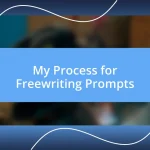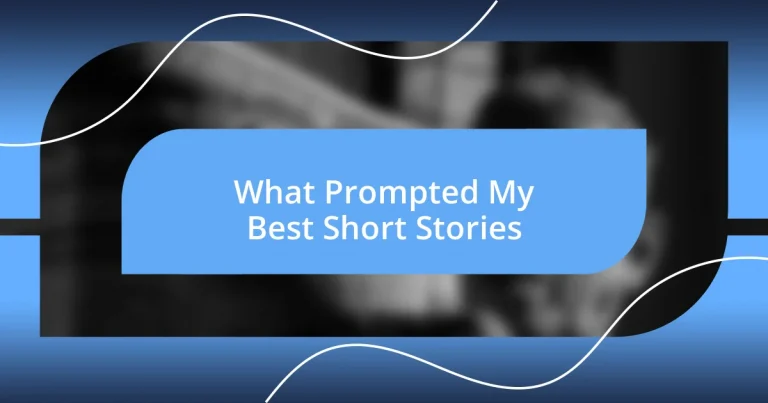Key takeaways:
- Story inspiration often arises from personal moments, emotional experiences, and observations of everyday life, fostering authentic narratives.
- Engaging with diverse perspectives enhances storytelling depth, allowing exploration of themes like empathy, nostalgia, and connection.
- Feedback and reflection are essential for growth in writing, helping to refine narratives and deepen emotional authenticity.
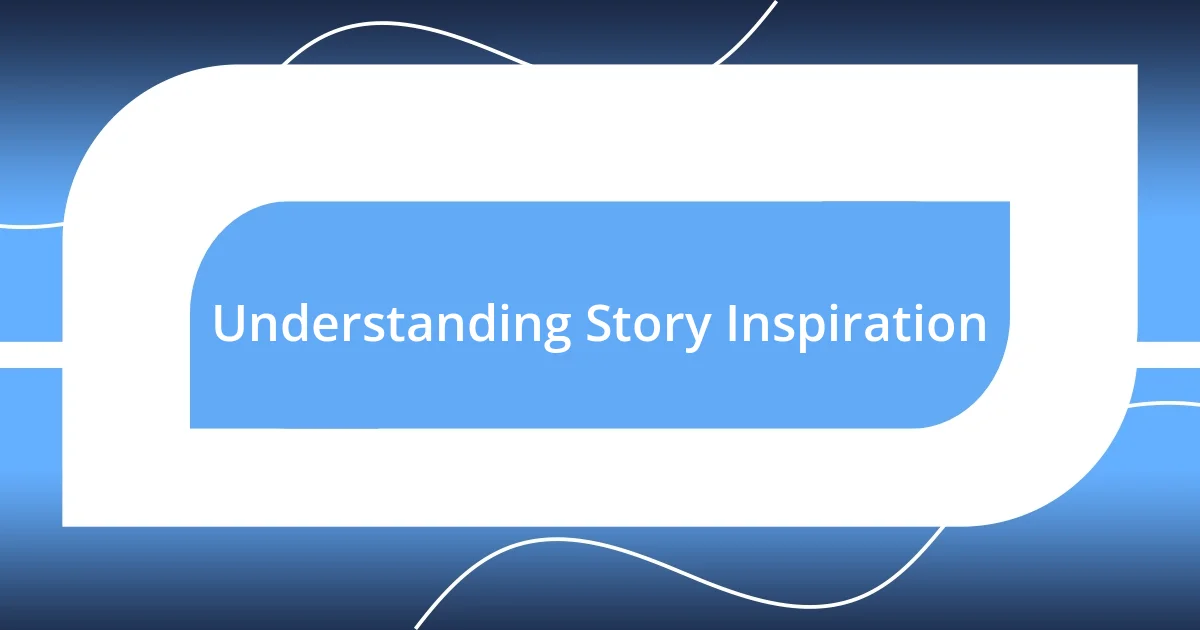
Understanding Story Inspiration
Understanding where story inspiration comes from is a deeply personal journey. For me, it often springs from a fleeting moment or a simple observation. I remember sitting in a café, watching strangers interact, and I had this epiphany—every person carries a story worth telling. Have you ever felt that spark when you notice something seemingly mundane?
Sometimes, inspiration strikes when I least expect it, often during quiet moments of reflection. For instance, I once found myself lost in thought while hiking. The beauty of nature ignited a story about resilience and finding one’s place in the world. It made me wonder, what environment nurtures your creativity?
I’ve also discovered that my own emotions, like joy, pain, or nostalgia, often fuel my writing. A heartfelt conversation with a friend can lead to a powerful narrative twist. Have you noticed how your feelings can transform the ordinary into something extraordinary? By tapping into those deep emotional currents, I can craft stories that resonate on a universal level.
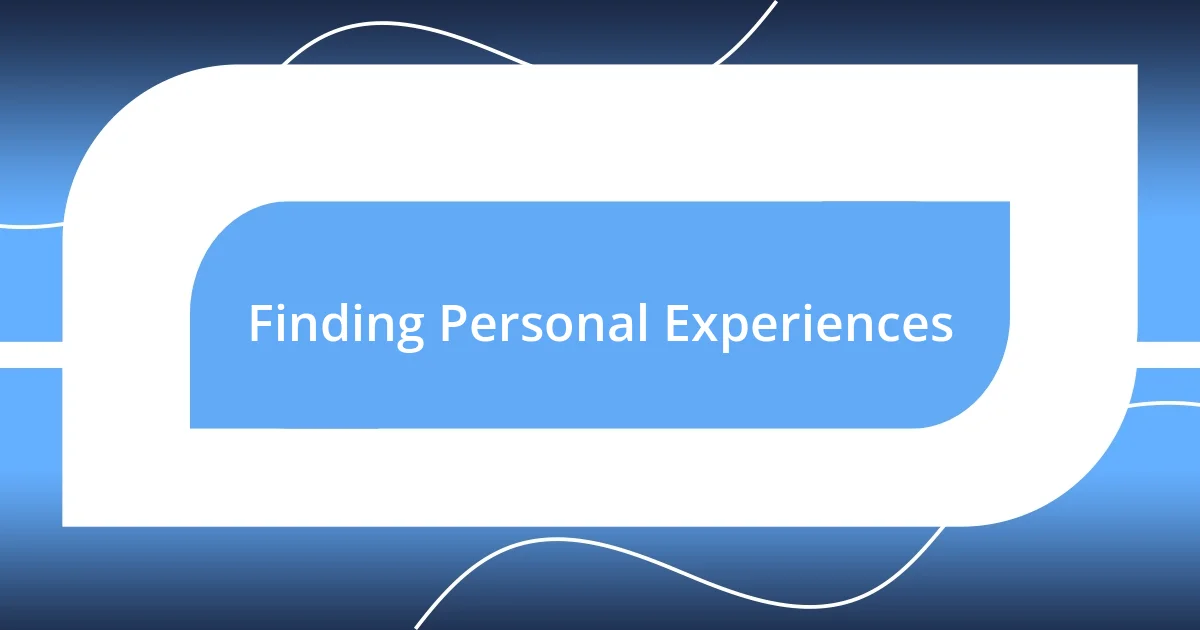
Finding Personal Experiences
Finding personal experiences is essential in shaping the narratives we want to convey. I recall a moment spent at my grandmother’s kitchen table, where the aroma of freshly baked cookies mingled with her stories from the past. Listening to her recount tales of her childhood, I felt a profound connection that inspired me to write about generational wisdom and the passage of time. Have you ever experienced a moment that sparked a deep sense of nostalgia?
Reflecting on friendships can also unveil rich material for storytelling. One rainy afternoon, I reminisced about a long-lost friend and how our paths diverged. That memory blossomed into a narrative exploring themes of loss and rediscovery. It prompted me to ask, how do our relationships shape the stories we tell?
It’s fascinating how different places evoke various emotions and memories. For instance, walking along the beach where I spent my summers as a child flooded me with joy and warmth. That experience reminded me of the power of setting in storytelling and how it can transport readers to a particular emotional landscape. What places hold meaningful stories for you that could inspire your writing?
| Personal Experience | Emotional Insight |
|---|---|
| Listening to my grandmother’s childhood stories | Generational connections enrich narrative depth |
| Reflecting on a lost friendship on a rainy day | Memories of relationships can inspire themes of loss |
| Walking along a childhood beach | Places evoke strong emotions and enrich storytelling |
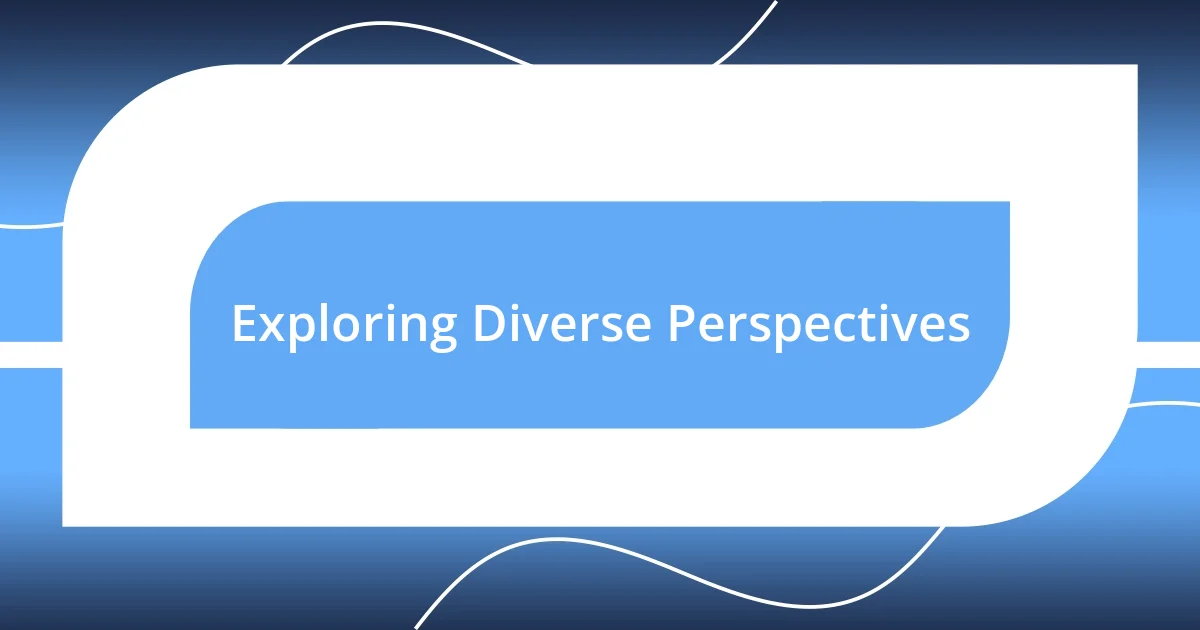
Exploring Diverse Perspectives
Exploring diverse perspectives has always fascinated me. I recall an evening spent at a local multicultural festival, where I engaged in conversations with people from various backgrounds. Each story I heard was like a window into another world, offering fresh insights on life experiences that I had never considered. The richness of our differences reminds me that every voice contributes to the tapestry of storytelling.
- Encountering a refugee’s journey shone light on resilience in adversity.
- A poet shared their experience of love lost, capturing the beauty of sorrow.
- Listening to an elder recount their migration story unveiled cultural traditions I had overlooked.
These moments of connection fuel my writing with depth, allowing me to weave together themes of empathy and understanding in my narratives. I’ve learned that when I embrace diverse viewpoints, I can create stories that reflect a broader human experience, resonating with a wider audience.
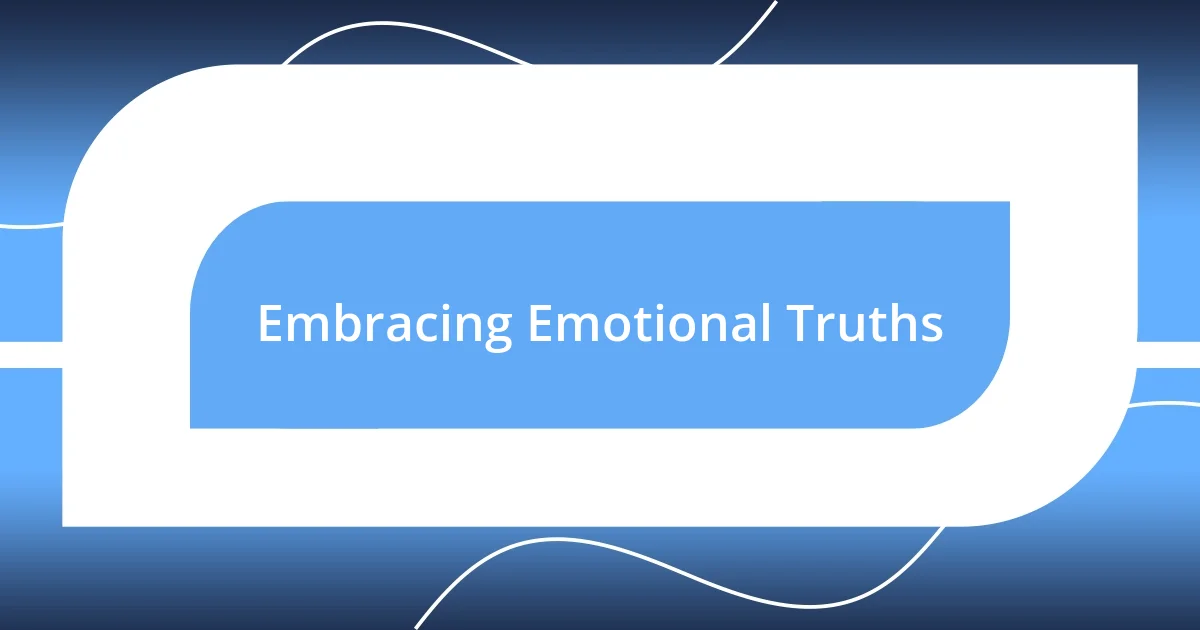
Embracing Emotional Truths
Embracing emotional truths means tapping into our most authentic feelings. I remember writing a story about a time I faced rejection during a job interview. I poured every ounce of disappointment and frustration onto the page, which made the character’s struggle surprisingly relatable. Have you ever felt the weight of unfulfilled dreams?
In another instance, a quiet evening alone stirred feelings of loneliness that I hadn’t acknowledged in a while. I took those raw emotions and created a narrative about a character who finds solace in unexpected places. It’s fascinating how vulnerability can lead to profound connections with readers. When was the last time your own emotions inspired your creativity?
Handling emotional truths isn’t always easy, but it can be incredibly liberating. After sharing a personal story about my father’s illness, I was overwhelmed by the feedback from readers who identified with the experience. It reminded me that when we share our authentic selves, we often touch others in ways we might not expect. What personal truths are you willing to explore in your writing?

Crafting Relatable Characters
Crafting relatable characters starts with understanding the human experience. For me, drawing inspiration from those closest to me has been invaluable. I remember sculpting a character inspired by my best friend, whose quirky habits and unwavering loyalty shone through. When I infused these traits into my writing, it not only made the character feel genuine, but it also allowed readers to see a reflection of someone they might know in their own lives. Have you ever thought about how your loved ones can influence the characters you create?
I also believe that flaws make characters more compelling. One of my most memorable characters was a woman grappling with self-doubt, mirroring my own struggles. I didn’t shy away from depicting her missteps and regrets, which made her journey toward self-acceptance feel intimate and achievable. Don’t you agree that it’s often through our vulnerabilities that we find strength?
Lastly, placing characters in relatable situations can illuminate their complexities. I once wrote about a family torn apart by secrets, inspired by a dinner conversation that revealed hidden tensions within my own family. As the characters navigated their conflicts, I realized they were embodying the universal struggle of balancing love and honesty. What instance from your life could you transform into a character’s pivotal moment?

Utilizing Writing Prompts
Utilizing writing prompts can serve as a powerful catalyst for creativity. I remember one particularly whimsical prompt that asked me to write about a character finding a mysterious key. That simple idea unlocked a hidden story about a lost treasure that ironically became a journey of self-discovery. Isn’t it amazing how a single prompt can take your imagination on an unexpected adventure?
I often turn to prompts when I find myself staring at a blank page, feeling stuck. One day, a prompt about “a conversation with the past” pushed me to explore my childhood memories and the lessons I’ve learned. This not only sparked a short story; it also helped me confront some emotions I’d buried deep. Have you ever noticed how a small nudge can lead you to profound insights?
Sometimes, using a prompt feels like chatting with a wise old friend—one who knows just how to inspire you. During a writing workshop, a colleague suggested we use a striking image as a prompt. I committed to writing about an abandoned house, which led me to craft a narrative that intertwined loss and renewal. It made me realize that, in writing, images can evoke layers of meaning and emotion. What imagery has sparked your own creativity recently?
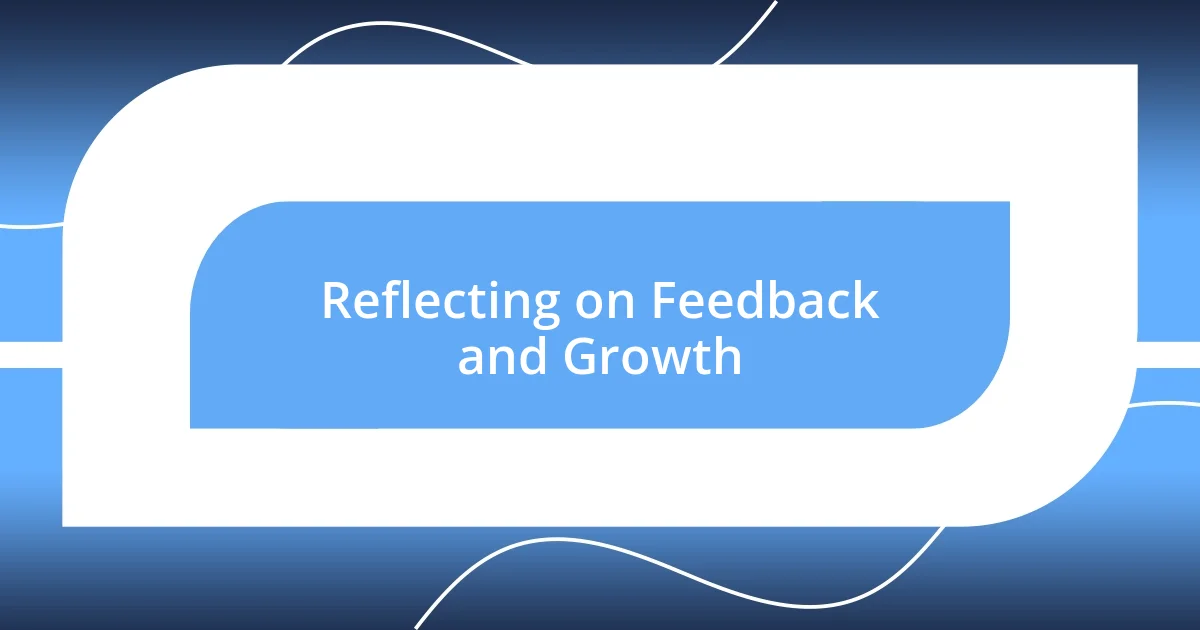
Reflecting on Feedback and Growth
Reflecting on feedback is a crucial part of my writing journey. I vividly remember sharing a short story at a writer’s group meeting, where I received some unexpected critiques about my character’s motivations. Initially, I felt defensive. However, as I spent time contemplating their perspectives, I realized that their insights could deepen my narrative. Hasn’t there been a moment when feedback transformed your understanding of your own work?
Every piece of feedback is a lesson in disguise. I once had a mentor point out that my ending felt rushed, urging me to flesh out the resolution. At first, I cringed, but upon revisiting the story, I saw how I had indeed skimmed over important emotional beats. I now understand that taking the time to reflect and revise can lead to growth in my storytelling. Have you ever revisited your writing and discovered layers you hadn’t initially acknowledged?
Growth, for me, is often accompanied by the courage to embrace vulnerability. After receiving some harsh but honest feedback on a story about grief, I felt exposed. Yet, that discomfort pushed me to dig deeper into my emotions and reshape the narrative into something more authentic. In the end, I not only improved the story but also connected with readers on a much deeper level. How has facing your vulnerabilities in writing helped you evolve?







